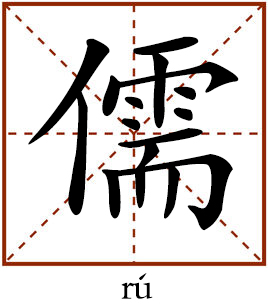Confucianism

In modern society, this character usually refers to objects of Confucianism. It originally referred to people who performed funerals, marriages and other ritual ceremonies before the advent of Confucianism. These people became the early group of intellectuals in China. The Book of Han is the first book to address Confucianism as ru.
谈笑有鸿儒
tán xiào yǒu hóng rú
Tanxiao means chatting and laughing. Hongru refers to great scholars. This is a line from a famous piece of prose by the Tang poet Liu Yuxi (772–842), “An Epigraph in Praise of My Humble Home” or “Loushi Ming.” It describes living in a simple dwelling, following a life that is refined in culture and learning.
“A mountain needn’t be high; it is famous so long as there is a deity on it. A lake needn’t be deep; it has supernatural power so long as there is a dragon in it. My home is humble, but it enjoys the fame of virtue so long as I am living in it . . . Erudite scholars come in good spirits to talk with me. And among my guests there is no unlearned common man. In this humble room I can enjoy playing my plainly decorated Qin, or read the Buddhist Scriptures quietly, without the disturbance of the noises that jar on the ears, or the solemn burden of reading official documents . . . Confucius once said, ‘How could we call a room humble as long as there is a virtuous man in it?’ ” (translated by Luo Jingguo)
Liu was once banished to remote parts of the Tang Empire because the political reform he participated in failed. He lived a tough life during the banishment but remained optimistic. The local government officials bullied him and forced him to move constantly until he settled down in a tiny, shabby house. Hence, he wrote this prose to express that he wouldn’t be knocked down by these frustrations because the house would be warm and comfortable as long as educated and virtuous people lived inside. The line “Erudite scholars come in good spirits to talk with me” depicts how all the friends coming to visit were people of knowledge and virtue, implying that his house was nobler than that of the wealthy and powerful people. This piece of prose is a mirror of the personality that the ancient literati valued—never corrupted by riches and honors, never surrendered to humbleness and poverty and never subdued by threats or force.
edited by REN GUANHONG
